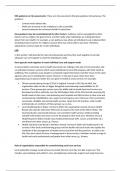HSE guidance on risk assessments- These are risk assessments that give guidance to businesses. The
guidance:
- Controls work related risks.
- Make sure everyone in the workplace is safe as possible.
- Assure businesses do not breach health & safety laws.
How guidance may be counterbalanced by other factors- Guidance can be outweighed by other
factors such as religion, the government, and the media when individuals are making decisions
about their own health. For example, a care pathway may advise an individual to eat a balanced diet
(including meat), however for religious reasons they may not be able to eat meat. Therefore,
adjustments must be made for certain individuals.
LAD
In this section I will describe the roles of professionals and how they work together to provide
adequate care and support to meet the individual’s needs.
How agencies work together to meet individual care and support needs
A main problem commonly seen in health and social care settings is the lack of communication and
co-ordination between services which causes individuals to have little progress with their health &
wellbeing. This could also cause people to constantly repeat themselves and their issues to the same
agencies who aren’t meeting their needs. However, in the past 5 years, there have been
organisations put in place to better the care given in health & social services. For example:
Clinical commissioning Groups (CCGs) in England- Formed in 2013 by the NHS, this
organisation helps to take on bigger delegated commissioning responsibilities for GP
services. These groups give service users the ability help to decide how local services are
developed and have authority over the NHS budget. Roles of the CCGs include assessing the
health needs in their area, commissioning most hospitals and NHS services in their area and
commissioning rehabilitative care, urgent and emergency care. Moreover, they commission
community, disability and mental health services. Apart from GP practices, other health
professionals are members of these groups e.g. nurses.
Local Health Boards in Wales- Formed in 2009, this organisation consists of seven Health
Boards who operate with three NHS trusts to improve the work of the NHS in Wales. The
local boards plan and provide primary care and other health services whilst providing
valuable information and closer care for the people in their local area. Members of Local
Health Boards in Wales include many health professionals (GPs, nurses, and dentists etc.)
and those from other areas e.g., finance.
Health and Social Care Board in Northern Ireland- Formed in 2009, this health board in NI
consists of five local commissioning groups and five health and social trusts who update the
standards of the management of health services and how well they perform. In order to do
this, they must check all areas of management in these services. Members include a range of
health and social professionals and people from other areas e.g., finance.
Role of organisations responsible for commissioning social care services
Local authorities manage social services to provide the best care they are able to give out. This
includes, personalising each patient’s care, strengthening community support and using local area
, knowledge to help this standard of care given. These authorities liaise with other organisations (NHS
partners) and take guidance (Public Health Outcomes Framework).
Role of bodies responsible for integrating health and social care
- Health and wellbeing boards (HWB)
Health and wellbeing boards were made after The Health and Social Care Act In 2012 was
introduced. They were made to be a forum for local health and social care professionals and to
integrate public services for health and social care. Their responsibilities are estimating the needs of
their local area, making sure everyone receives the same care, set out health approaches for other
organisations (CCGs) and encourage the use of partnership working. The boards are a main element
of the Care and Health Improvement Programme, who help HWBs with leadership and better their
support given. Moreover, instead of HWBs having main leaders, they focus on building relationships
instead to reach success.
Role of assessment and eligibility frameworks
Assessment and eligibility frameworks are ways to assess an individual’s needs. By following these
frameworks, health and social care services should learn how to:
Reduce inequalities in health services.
Increase consistency and understanding.
Focus on individuals and their needs rather than services.
Integrate services and unite them together.
Liaise appropriately with other services to reduce the need for individuals to repeat
themselves.
Work on prevention by focusing on people’s needs and care.
The Education, Health and Care Plan (EHC)
This care plan, dedicated for those under the age of 25, works with individuals who need extra
support which cannot be accessed through special educational needs (SEN) support. Anyone can
appeal for an EHC, including parents, teachers, health visitors, doctors etc. After requesting, the local
authority will carry out an assessment for the individual.
Roles and responsibilities of key professionals on multi-disciplinary teams
Multi-disciplinary teams, members and formation
A multi-disciplinary team is a member of health and care professionals who work in separate
organisations and roles but work together to support an individual or family and meet their needs.
Implementing a multi-disciplinary team ensures that patients get the best possible care and receive
better service. The teams use holistic approaches to assess issues and ensure all information is
shared to avoid repetition and misunderstanding.
Healthcare professionals
Each member of their multi-disciplinary team has different roles and responsibilities that are
cantered around the individual’s needs. As an example, a patient suffering with diabetes will have a
team including professionals such as: a dietician, a doctor, a pharmacist and a dentist. A few health
care professionals include:
Professional Role Responsibilities




